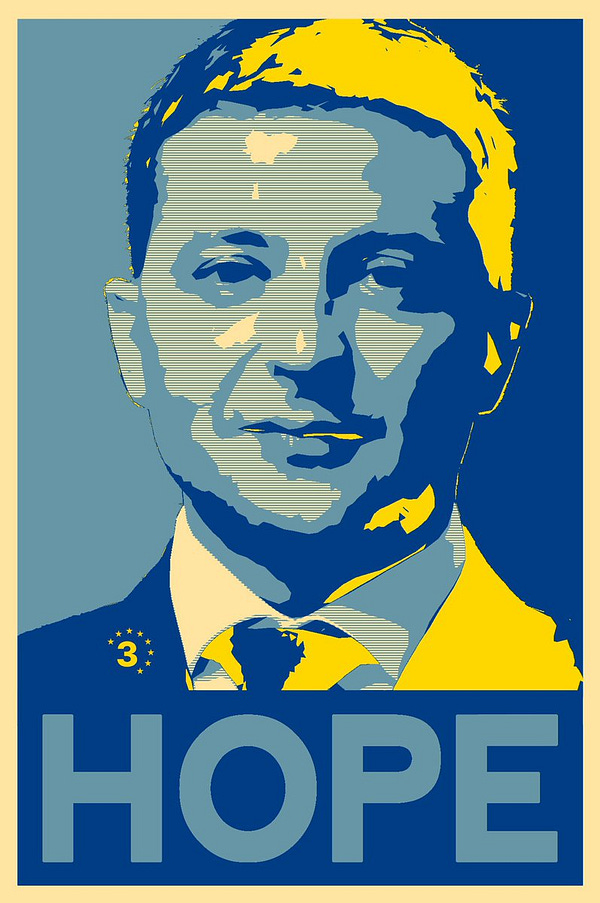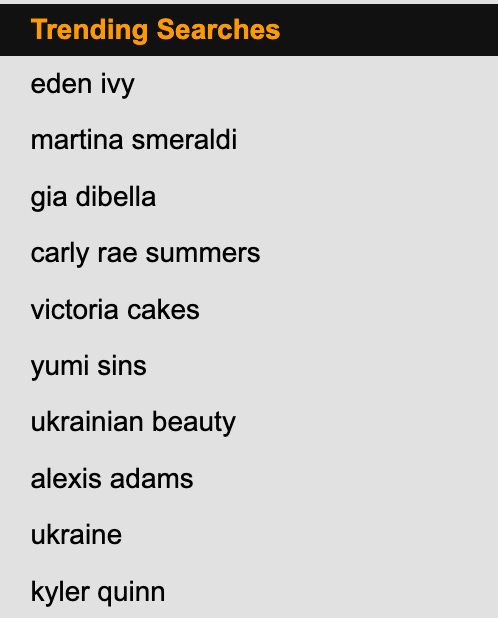When stan culture meets armed conflict
On the tendency to 'stan' and sexualise politicians, and how it manifests during an outbreak of war.
This is Ukrainian President Volodymyr Zelenskyy. You’ve probably heard of him, perhaps for the first time only recently. You don’t need me to summarise the invasion of Ukraine taking place right now; my attempt to do so would only demean us both.
What I do want to talk about is the online response, particularly from liberals living in the west, to this man’s rapid ascension to global superstardom. And I use that word deliberately, because many are treating him like they would any other celebrity – that is, by engaging in tactics and employing rhetoric primarily seen in stan culture.
This isn’t unheard of; we’ve seen it with other politicians, primarily American and Canadian ones (plus Jacinda Ardern for good measure) like Barack Obama, Hilary Clinton, and yes, even Bernie Sanders and Alexandria Ocasio-Cortez. The similarities are even more obvious when you see tweets like this, updating Obama’s famous HOPE poster from his 2008 presidential campaign to reflect current events. In the cases of Obama, AOC, and Canadian Prime Minister Justin Trudeau in particular, much of the support people express for them is also related to how attractive they find them.


While stanning politicians seems to have become the standard way some people engage with politics, it’s rare to see this crossover where westerners are encountering a non-western politician; many people simply wouldn’t normally be sufficiently acquainted with foreign politicians to stan them.
For some, stanning means inserting Zelenskyy into their favourite superhero franchise, like this video that labels Captain America in Avengers: Endgame as ‘Zelensky’ while Thanos and his army of aliens represent the Russian army.
On this video, Ryan Broderick noted in his newsletter (which is one of the few I read religiously), “Thankfully, most people who are sharing it are sharing it because it’s insensitive, idiotic, and actually kind of grotesque, but the fact that some people are genuinely interacting with this and that Anders even posted it in the first place is an incredible display of how sociopathic platforms like Facebook and Twitter make us.”
Unfortunately, some have taken the superhero association a step further, with a few fans casting Jeremy Renner (who plays Hawkeye in the Marvel Cinematic Universe - you’d be forgiven for not knowing this) as Zelenskyy in the inevitable movie about this conflict. It’s worth noting that this was by no means a widespread trend, and the NY Post article did more to amplify the fancast than any single tweet did.
I don’t know what Zelenskyy has done to deserve any sort of comparison to Jeremy Renner of Jeremy Renner Official app fame.
For others, stanning Zelenskyy means thirsting over him. I know. I’m sorry for typing those words and making you read them. But it’s real, and it’s happening. Again, I’m sorry.


Note the way the second tweet universalises - ‘every woman’ feels this way. If every woman feels this way, it can’t be weird, and you can’t shame me for it!
Bonus: Zelenskyy isn’t the only Ukrainian man being objectified!
This tweet from Kim Tran sparked an interesting discussion on this issue:

One user responded, “The American urge to make every news story into entertainment, and to idolize the "leading men.”” I partially agree with this, in that we seem far more likely to consume news content if it’s presented to us in an entertaining way, but I don’t think it’s an exclusively American phenomenon.
Having said that, we (as internet users) do tend to see this sort of ‘crushing’ on politicians primarily from North Americans about North American politicians - English-speaking internet discourse skews American, so it’s inevitable. But there are multiple Ukrainian language TikTok accounts dedicated to Zelenskyy, with several being created in the past two weeks, while others have been around since 2019. Here’s one from Pakistan!
If you thought the thirst tweets were bad, the thirst TikToks may actually be worse. Here’s one person getting excited about the fact he speaks English, which isn’t particularly noteworthy for a European leader that has to engage with other European leaders on a regular basis, but I digress. The caption is “He’s so handsome <3”, seemingly drawing a link between his ability to speak English (and thus appeal to western audiences) and his attractiveness.
This video pays lip service to its own inappropriate nature, reading, “It’s not the time nor place to have a crush on President Zelenskyy… buuuuut…” with the caption, “The heart wants what it wants”.
This is probably the weirdest video I found; it implies that Putin has a tiny penis, while Zelensky gives “big d vibes”, per the caption. Reducing geopolitical conflicts to differences between people’s anatomies is disturbing for a lot of reasons, but primarily because I resent being made to think about Putin’s penis.
Back on Twitter, it seems some people can sense that it’s inappropriate to stan or thirst over a politician trying to lead his country through a literal war, so they’re pivoting to focusing on Zelenskyy’s past as an entertainer. Hence the uptick in tweets about his time as the voice of Paddington in the Ukrainian version of the movie, or his time on Ukrainian Dancing with the Stars (this video has over 5 million views).
In my opinion, much of this is born from the need people have to post and engage with any and every topic they come across, regardless of whether or not their contributions are constructive or not. Framing things in terms of superhero movies or someone’s good looks are also the easiest ways to engage with something as complicated as a geopolitical conflict in a region you haven’t previously given much thought to. It allows users to maintain the appearance of being politically engaged without actually engaging with politics.
Unfortunately, it also requires the dehumanisation of Ukrainians to a certain extent. It reduces them to objects of our sexual desire, because appearances are all many westerners have to go on when it comes to Ukraine. On this note, Fahad Ali wrote, “Western liberals have had to construct for themselves an “idea” of Ukraine. Which means that virtually everything Western liberals believe about Ukraine is fantasy, and that come with all that fantasy entails: projection, sexualisation, fetish. This is why “Ukrainian girl” is trending on PornHub, and why people are post shit like this.” (The “Googling Ukrainian men” tweet that I linked to above was attached.) While I’m sure the intent isn’t malicious, I’m not sure how performing thirst for your followers on social media actually helps anyone, least of all Ukrainians.
It seems easy for westerners to view wars occurring elsewhere as a scripted spectacle with good guys and bad guys, superheroes and heartthrobs, because we’re so disconnected from it all. That’s also why the defence people present that they’re doing it in order to ‘cope’ falls flat - what do you, as a middle class American, have to cope with exactly? What do I have to cope with? Why is this about our feelings at all?
But these tweets from British writer Hussein Kesvani provided some food for thought:


Ultimately, without further moderation from social media platforms themselves (and I’m not even sure how that would work or if it’s the best idea), the best solution I can think of is for people to log off. I wrote about the need to ‘bear witness’ a few weeks ago, and I think it still applies; you aren’t automatically an awful person if you don’t document your response to every news story or current event in real time – it’s not sustainable and it’s also not productive.
You’re also less likely to put your foot in it if you simply don’t post. Not posting: it’s the new pink. Try it out sometime!











